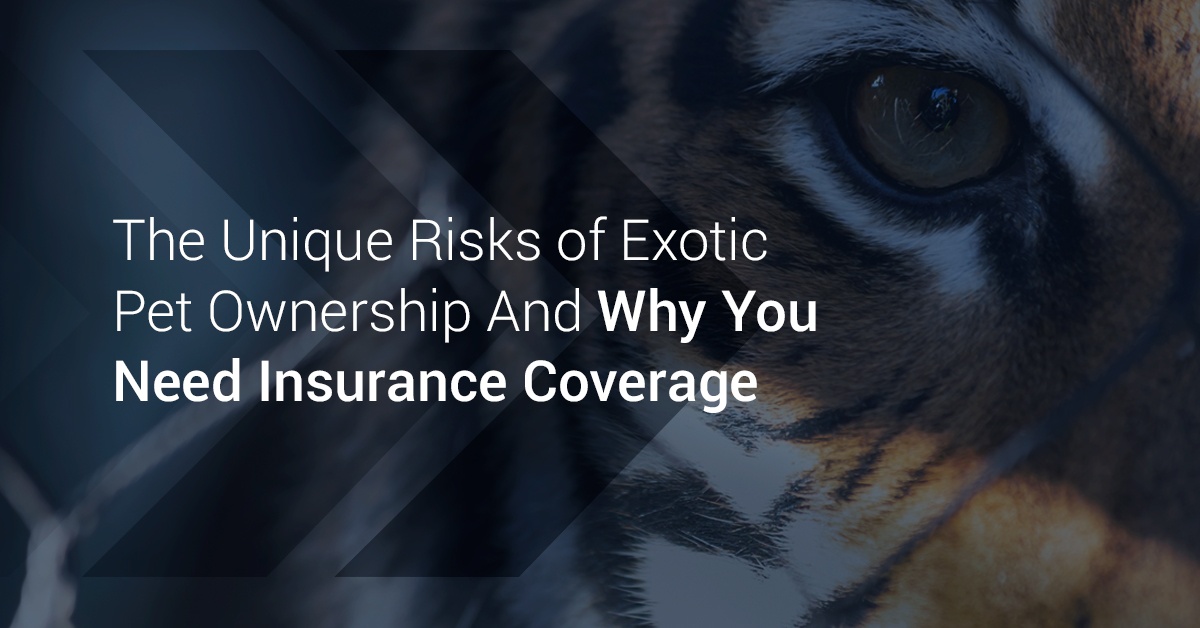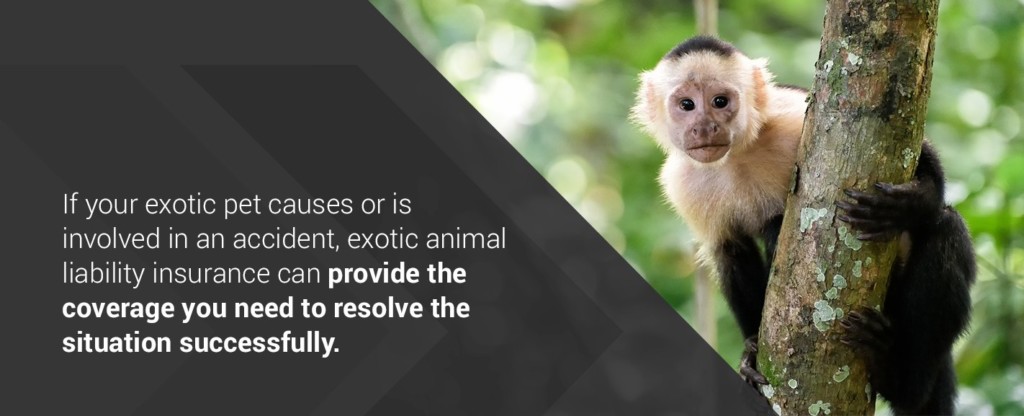
The Risks of Exotic Pet Ownership And Why You Need Insurance Coverage
Owning an exotic animal is very different from owning a traditional pet, like domesticated dogs and cats. Exotic pet ownership tends to be more expensive and risky. These pets require more maintenance and supervision than your average house cat or dog.
The popularity of the documentary “Tiger King” has recently shed light on exotic pet ownership. With the risks that exotic pet ownership poses, obtaining proper insurance is crucial. There have been more than 1,000 incidents reported involving exotic pets since 1990. Despite the risks and rate of incidents, statistics on exotic pet ownership show that ownership of these animals has increased significantly within the past decade, and approximately 13% of households count exotic animals as pets.
At XINSURANCE, we strive to be a dependable resource for exotic pet owners. We can provide you coverage solutions if your pet harms someone physically.
How “Tiger King” Brought to Light Exotic Pet Ownership and the Unique Risks
Netflix’s “Tiger King” has become widely popular and sparked public debate about keeping big cats in captivity. Many viewers were surprised to find out in the documentary’s first episode that more tigers live in captivity in the U.S. than live in the wild. The documentary has led many to wonder how many legal exotic pets are privately owned and to question the morality of keeping exotic animals in captivity.
Unfortunately, states vary in how they define exotic animals. Some states specify exotic animals as dangerous wildlife, while other states seem to define exotic animals as those that are found in the wild and are not domesticated. Animals that are considered exotic pets may include:
- Birds
- Reptiles
- Rabbits
- Horses
- Monkeys
- Foxes
- Pigs
- Tigers
- Lions
- Leopards
- Jaguars
- Cougars
- Cheetahs
- Bears
- Coyotes
- Wolves
- Chimpanzees
- Gorillas
- Baboons
With the popularity of “Tiger King,” the focus has particularly been placed on big cats. Is owning a big cat legal in your state? If you do own or plan on owning one of these animals, you should purchase exotic pet liability insurance, as this is a critical element of successful exotic pet ownership.
Laws Governing Exotic Pets
Exotic animal laws vary by state. Comprehensive bans currently exist in several states and prohibit the private ownership of certain animal species or allow certain animals to be privately owned only under certain licenses. Comprehensive bans tend to classify primates, wild cats, reptiles and non-domesticated carnivores as dangerous animals.
The following states currently have comprehensive bans on owning an exotic animal:
- New Hampshire
- Vermont
- Massachusetts
- New York
- New Jersey
- Maryland
- South Carolina
- Georgia
- Ohio
- Kentucky
- Illinois
- Iowa
- Colorado
- New Mexico
- Utah
- California
- Oregon
- Washington
- Hawaii
Other states have implemented partial bans on ownership of exotic pets, which means certain species of animals are banned, but not all. These states include:
- Connecticut
- Virginia
- West Virginia
- Michigan
- Tennessee
- Florida
- Louisiana
- Arkansas
- Minnesota
- Nebraska
- Kansas
- Wyoming
- Alaska
Other states require individuals to obtain a license or permit scheme to privately own an exotic animal, while a few other states have no statutory or regulatory scheme about the private ownership of exotic animals.
What Is Exotic Pet Insurance?
While traditional animal liability insurance covers cats and dogs, many families are adopting other animals like birds, guinea pigs, reptiles, ferrets, rabbits and other exotic pets. Standard animal liability insurance may not cover these exotic animals, but exotic animal liability insurance does.
Animal liability insurance is third-party coverage, which means this policy provides coverage for others rather than you or members of your household. For example, if your dog jumps on a passerby, and the passerby falls and is injured as a result, animal liability insurance can cover the injured person’s medical bills. Exotic pet liability insurance provides this coverage for exotic animals, rather than for traditional pets like dogs.
What Is Covered in Exotic Animal Insurance?
Many exotic animals have unique requirements, like additional maintenance for their shelter, particular care needs and special personality characteristics to consider. Given these unique circumstances, even well-behaved exotic animals tend to pose a greater risk to the general public. If your exotic pet causes or is involved in an accident, exotic animal liability insurance can provide the coverage you need to resolve the situation successfully.
What Are the Benefits of Having Animal Liability Insurance for Exotic Pets?
If you are not covered by exotic pet liability insurance, you may leave your assets exposed in the event of a lawsuit. Insurance policies are becoming increasingly exclusionary, even restricting policies to certain dog breeds. Some insurance policies completely exclude animal liability coverage. For exotic animal owners, this means your homeowners’ insurance policy likely does not cover your exotic pets.
Fortunately, exotic animal liability insurance can provide exotic animal owners with the coverage they need. Your assets can be protected in the event that an incident involving your exotic pet results in property damage or bodily injury to a third party. This coverage can give you true peace of mind so you can enjoy time with your exotic pet without worrying about an accident.
Types of Exotic Pets Covered
Will your exotic pet be covered by exotic pet liability insurance? The animals covered under exotic animal insurance depends on your policy and insurance provider. Animals covered under exotic animal liability insurance may include:
- Big cats
- Birds
- Chinchillas
- Gerbils
- Guinea pigs
- Hamsters
- Ferrets
- Rabbits
- Mice
- Rats
- Amphibians
- Chameleons
- Geckos
- Iguanas
- Other lizards
- Turtles
- Tortoises
- Sugar gliders
- Snakes
- Hedgehogs
- Potbellied pigs
- Goats
- Horses
- Monkeys
- Foxes
- Wolves
- and more
Dogs and house cats are not covered under exotic pet liability insurance, as they are covered under standard animal liability insurance policies.
Exotic Pet Liability Insurance FAQs
Have further questions about exotic animal insurance? Below, we’ve included some of the most frequently asked questions we receive about exotic pet liability insurance:
1. Does Exotic Pet Liability Insurance Cover Injuries to Me or Damage to My Property?
An exotic animal insurance policy can provide coverage for damage to a third party’s property or for bodily injury of a third party. Exotic animal insurance won’t cover injuries to you or the members of your household, along with damage to property that you rent or own.
2. Will My Pet Be Dropped From Coverage Due to Age?
The right insurance provider won’t drop your pet from coverage as it ages. As long as you avoid a lapse or expiration of coverage, your insurance provider should not drop your pet due to age.
3. Can I Cancel My Animal Liability Insurance Policy Before the Term Expires?
You can cancel your exotic animal liability insurance policy at any time. You will need to contact your insurance provider to cancel your policy and may need to cancel the policy in writing. If you cancel before the term is up, you may receive a refund for your unused premium.
4. What Kind of Risks Do Big Cats Pose?
A surge in interest in big cats as exotic pets has accompanied the rise in popularity of “Tiger King.” While many websites purport that holding exotic animals in captivity is highly dangerous, the statistics of recorded incidents are nuanced.
One study showed that from 1990 to 2014, there were around 260 severe or fatal exotic cat attacks. Among those attacks, data shows tigers were the most common species involved, with cougars and lions tied for second place. The largest portion of these attacks occurred within zoos, many of which were accredited by the Association of Zoos and Aquariums. The second-largest demographic for exotic cat attacks was private pet owners.
Though data shows exotic cats can pose a safety risk to the general public when handled improperly, the same is true for domesticated dogs. According to the Centers for Disease Control and Prevention, almost one in five dog bites requires medical attention. The bottom line is that both domestic and exotic pets may present a risk for an accident. Because big cats and other exotic animals often have unique characteristics that can elevate this risk, exotic animal liability insurance can provide even more peace of mind.
Contact XINSURANCE for Exotic Pet Liability Insurance
If you plan on owning an exotic pet, purchasing exotic pet liability insurance is essential. At XINSURANCE, we believe no one should have to worry about being underinsured. We strive to provide our customers with customized terms and coverage. We minimize exposures to give you the peace of mind you need as an exotic pet owner.
Do you have a question about getting exotic animal liability insurance? Contact us at XINSURANCE for more information, or get a quote from us today. We are happy to answer any of your questions and discuss your insurance needs.

Rick J. Lindsey hails from Salt Lake City, Utah. He began working in the mailroom of his father’s Salt Lake City insurance firm, getting his introduction to the business that became his lifelong career. Rick J. Lindsey quickly rose through the ranks while working in nearly every imaginable insurance industry job. As an entrepreneur, specialty lines underwriter, claims specialist, risk manager, and a licensed surplus lines broker, Rick J. Lindsey is highly skilled in all levels of leadership and execution. As he progressed on his career path, Rick J. Lindsey discovered an urgent need for insurers willing to write policies for high-risk individuals and businesses. He was frequently frustrated that he could not provide the liability protection these entities desperately needed to safeguard their assets. He also formed the belief that insurance companies acted too quickly to settle frivolous claims. Rick J. Lindsey decided to try a different approach. He started an insurance company and became the newly formed entity’s CEO. This opportunity has enabled Rick J. Lindsey to fill a void in the market and provide a valuable service to businesses, individuals, and insurance agents who write high-risk business. XINSURANCE also specializes in helping individuals and businesses who live a lifestyle or participate in activities that make them difficult for traditional carriers to insure. If you’ve been denied, non-renewed, or canceled coverage, don’t give up quite yet. Chances are XINSURANCE can help.



